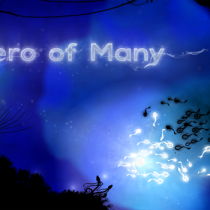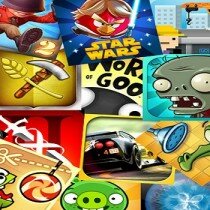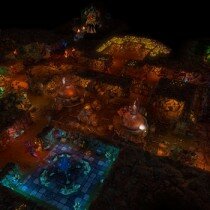There are normally two parts which make a game’s atmosphere and sense of immersion truly memorable; the gameplay and the soundtrack. With the leaps and bounds of progress driving forward graphical innovation at a rate that many struggle to keep up with, it is all too easy to forget how involved we felt in the games of yesteryear before HD and 3D graphics. In the same way that we remember a game with fantastic gameplay, a good soundtrack is will always accentuate our love for a good game. But how do you put together a soundtrack for a game? I recently met up with Matthew Chastney, a freelance Composer and Sound Designer who has worked on a number of gaming titles to find out how you go about making a game’s soundtrack and sound effects memorable
Kung Fu Superstar – one of the projects Matt has worked on
First things first – Do you find work or does work find you?
At this stage work normally comes about through word of mouth. It’ll also come through producing demo tapes, building connections on various forums and also through auditioning.
Auditioning?
Yeah, the first thing that will normally happen is that you’re given a non-disclosure agreement to sign, along the lines of if you leak any of the details of this game you will be shot. You’re then given your brief. It’s normally screenshots, video footage if you’re lucky, and a list of the sort of effects that they’d like. You’d then put your work together and send it off, and its then a case of waiting for however many weeks to find out if they like it.
Whilst it’s crude to ask – is it a well-paid job?
The fees will vary from project to project based on many factors, and as a freelancer it’s up to me to price the work accordingly. As the job is both a creative and technical one there is definitely money to be made but there are a lot of people all competing for the same jobs.
Fair enough. What sort of projects do you find particularly interesting?
The good thing with working on games is that you get to work on such a variety of different styles. I’ve recently been working on a smartphone game where they had asked for traditional Chinese music, which is a whole world away from a first person shooter I’m working on at the moment where they’re after a very dark style of soundtrack. There isn’t a particular style that I like, it’s all interesting.
Supposing you’re sent something like a horror game. Where do you begin?
Sometimes the games developer will already have an idea what they want and will try and spell it out for you. Other times it’s a case of talking to the developer to get an idea of what they’re after, what their intentions and ideas were when they were designing the game. From there, it’s a case of improvising; trying things and seeing what works and what doesn’t fit. Personally, when I’m working on a project I try not to listen to too much music as it’s harder to be original when you’ve got already got something in your head.
Is there a lot of first time success or do you get ‘no, this isn’t what I want I want it to sound like Silent Hill?’
You have to remember you’re working with creative people, and they’re usually perfectionists who have their own ideas as to what they’re after. I worked with one guy who used to send me whole essays of feedback detailing exactly what he wanted me to change, but then I’ve worked with others who I’ve sent through my work and all I’ve had back is ‘Yeah it’s good’. It’s a mixed bag, and it depends on their interest in music. Some see it as just background music, whereas others think it’s more integral to what they’re doing. With this job you have to be able to take criticism and feedback and use it to help you develop your work, it can be easy to take things personally but it’s important to remember that the music and sound effects are just one part of a combination of many other creative elements, and the directors/producers are giving their feedback to help make this combined effort the best it can be.
What games’ soundtracks have you been particularly impressed with?
Recently the big one I’ve been impressed with is Journey which was nominated for a Grammy award, although a lot of my favourites are quite old. Super Metroid for example is one of my favourites, as are Shenmue and the Final Fantasy games.
So how does someone get into this line of work?
If you want to get into games, the best way to do it is to start out with student games from game design colleges. They’ll be making games as part of their course and will generally be looking to get someone in to do the sound effects and soundtracks, which allows you to build up a bit of a portfolio. Mods are a good way to get into it as well, there are still plenty of Half Life 2 mods being made where a sound designer gets used to do the effects. Obviously these are free projects so they don’t pay, but they help you learn how to work with the projects and developers; the main thing is to build up your portfolio. From there, it’s a case of producing quality work and showing it where you can. Often it’s a case of being lucky.
So where next for you?
I’d like to move onto the bigger console games; currently I mainly work on PC and app games. Obviously working on the bigger games would be good, but also looking away from the gaming market I’d like to move into films. Although to be honest I’m pretty lucky to do what I do so I can’t complain!
Time for some hard hitting journalism – What’s the biggest project you’ve worked on?
There’s a PC adventure game I’ve been working on called Cognition which has had some pretty good reviews and is probably the biggest game project I’ve worked on. For TV, I’ve had work licensed for TV shows like The Voice, Big Brother and a couple of other bits that I’m not allowed to talk about yet!
CognitionUnlike most journalists, I chose to do my research after I had completed my interview. A quick look on Matt’s website shows that not only is he hugely modest about the work he has done, he also didn’t mention that In 2012 he was presented with the “Student/Apprentice Award for Sound Design” at the Game Audio Network Guild awards held at the Game Developers Conference in San Francisco, California. Unfortunately this was my first attempt at proper journalism and I was found wanting. Sorry about that, I’ll stick with playing games in the future.
Hopefully, if you’re a wannabe composer and want to get into the gaming scene this article will have given you a few pointers on where to get started, and if you’re interested in finding out a bit more on Matt Chastney you don’t have to be a journalist to find his website (or you could just click here)
© 2013 – 2014, zero1gaming.com. All rights reserved. On republishing this article your must provide a link to this original post
About Drew Pontikis
Drew Pontikis is an avid gamer and writer. A fan of racing sims and first person shooters, Drew is notable for talking almost exclusively using Futurama quotes.He's usually found in front of his Xbox or his laptop, follow him on Twitter as Gamertag: drewski060609
• •




